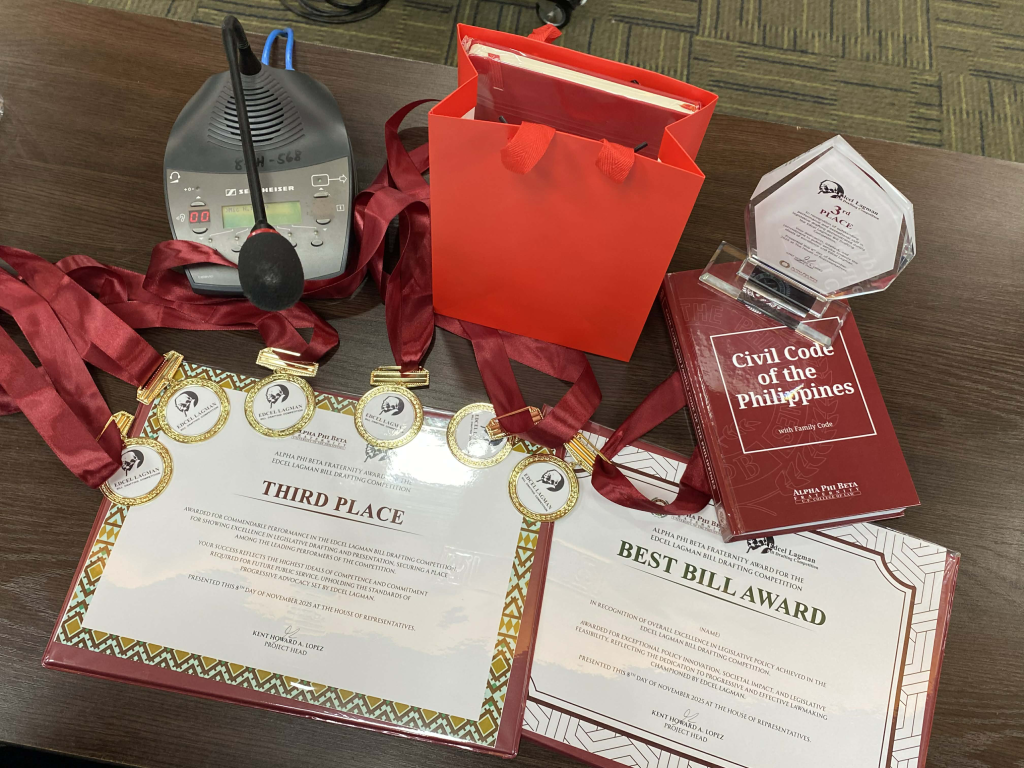by Bonnie Marticio
On November 8, 2025, at the Nograles Hall of the House of Representatives, Team BHH — composed of Paul Cano, Bonnie Marticio, Grazel Pumicpic, and Hendrix Ramos of II-BA Philosophy, alongside Kyle Nulada and Kathleen Paragele of NCPAG — proudly represented the University of the Philippines Diliman at the Edcel Lagman National Bill Drafting Competition. From an initial pool of thirteen university teams nationwide, they emerged as one of the seven finalists invited to present in Congress.
Team BHH ultimately clinched the prestigious Best Bill Award for their proposed legislation entitled,
“The Magna Carta of Alternatively-Employed Workers: An Act Providing a Magna Carta for Alternatively-Employed Workers.” They also secured 3rd Place Overall, distinguishing themselves both in substance and presentation.

From L to R: Hendrix Ramos, Kathleen Parable, Kyle Nulada, Paul Cano, Grazel Pumicpic, and Bonnie Marticio
A Day in the House of Representatives
The team arrived early at the House around 11:00 AM on the final day, polishing their presentation slides on the spot while absorbing the gravity of presenting in a real committee-hearing setting. The event began at 1:00 PM, with an atmosphere that was both formal and intense. The team carried with them a mixture of excitement, pride, and nervous energy.
Despite being given only 10 minutes to present a highly technical and comprehensive bill, the team spoke with confidence and clarity. The judges immediately praised the draft as well-written, well-structured, and truly forward-looking, noting that it was not only competition-worthy but reflective of real-world legislative viability.
Their proposed Magna Carta of Alternatively-Employed Workers seeks to protect and empower workers in non-standard forms of labor. This includes freelancers, platform-based workers, delivery riders, short-term contractors, and remote gig workers. This is through the establishment of safeguards in occupational safety, access to training and upskilling, fair and development-oriented labor credit, and institutional recognition of good labor practices. At its core, the bill embodies a principle deeply aligned with the philosophical tradition of justice and human dignity: that every form of labor deserves protection, opportunity, and respect.
The interpellation that followed was not adversarial, but constructivee. Committee members — Professor Enrico Basilio, DPA, Professor Lizan Perante Calina, DPA, Dr. Reginald Ugaddan, PhD, and CONSA President Vince Borneo — engaged the team in thoughtful dialogue, allowing them to clarify policy details, defend their economic rationale, and demonstrate the depth of their research.
A Convergence of Disciplines
Team BHH’s strength lay in its interdisciplinary synergy. The BA Philosophy majors contributed rigorous analysis, ethical framing, and airtight argumentation. Meanwhile, the NCPAG members grounded the bill in legal feasibility, administrative realism, and practical governance. Together, they crafted a bill that managed to be both visionary and implementable — a rare combination in student-led policy drafting.
The Dramatic Announcement
As the competition drew to a close, tension filled Nograles Hall. When the judges finally announced the results, Team BHH was stunned to hear their team awarded the Best Bill Award, followed by a 3rd place overall finish. The room erupted in cheers and laughter as the team embraced – proud not only of the award, but of the collaborative journey that brought them there.
Team BHH’s achievement demonstrates the strength of interdisciplinary thinking and the potential of young Filipinos to engage meaningfully with nation-building. Their success stands as a testament to the capacity of students — armed with reason, compassion, and a commitment to public service — to shape the laws and policies of a brighter tomorrow.
For the Department of Philosophy and the University at large, this victory is both a source of pride and a reminder of the continued relevance of philosophical training in addressing real-world social issues.

